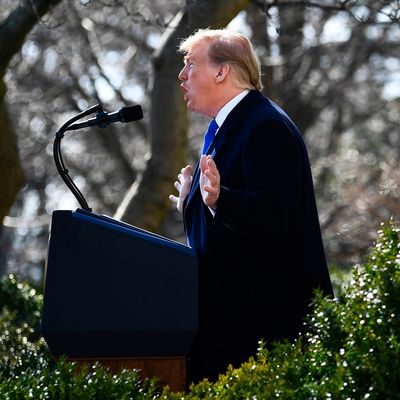
“We had a little disappointment for the first year and a half. People that should have stepped up did not step up,” Donald Trump complained in the Rose Garden on Friday. Trump spoke of Congress, which had sent him a spending bill that would prevent a second government shutdown, but lacked the full funds he’d demanded for his border wall. As press and members of the administration looked on, he declared a national emergency to bring his precious steel border fence to life. As he did so, he repeated a set of familiar lies: Other nations just aren’t sending us their best. Immigrants are violent. A border wall would even help stop the drug crisis, he insisted, just as he’s insisted over and over in the past.
Trump’s lies are his stock-in-trade, and they weren’t the most noteworthy aspects of Friday’s announcement. That dubious distinction belongs instead to his decision to declare a national emergency. Though it’s not yet clear how meaningful the declaration will prove to be, it’s a sweeping gesture that members of both major parties have criticized in the press as a potential violation of the Constitution.
Confronted with this attempted power grab, journalists assembled for the president’s speech responded by challenging him on his facts. When Playboy’s Brian Karem and CNN’s Jim Acosta directly addressed the gap between Trump’s rhetoric and reality, Trump reacted as he usually does in these situations: with pointed fingers and complaints of “fake news.” When Acosta told the president that data produced by his own government shows that immigrants as a group simply aren’t more prone to violent crime, Trump essentially shrugged. “You don’t really believe that stat,” he told the journalist. Later, when Acosta asked him to respond to claims that he was “concocting” an emergency, Trump pointed to a pair of women in the front row of his Rose Garden audience. “Ask the angel moms,” he said. “What do you think? Do you think I’m creating something?”
The angel moms, as Trump calls them, are the parents of children who have purportedly been killed by undocumented immigrants. He often invites these families to appear at his rallies, where their tragic stories become fodder for the his hostility toward immigrants. As Trump gesticulated toward the angel moms, you could almost hear a thousand veterans of one of the internet’s stupidest debates sigh at once. The plural of anecdote is not data. Trump could bring out a dozen angel moms and angel siblings and angel grandparents onto every stage he takes between now and November 3, 2020; their stories are heartbreaking, but they still don’t prove that there’s any kind of widespread crime wave caused by the presence of the undocumented immigrants in this country. If there is no crisis, there’s no need for a border wall and thus no need for a national emergency to facilitate its construction.
More than two years into Trump’s presidency, no one should be shocked to learn that he lies. While there are countless fact-checks that prove that point, they do not tell us much about the danger posed by Trump’s emergency declaration, or by Trump himself.
It’s a journalist’s job to confront the powerful about the myths they invent to justify their actions. But it seems futile to grill Trump on where he gets his facts when there’s no evidence that truth is important to him at all. Trump’s speech from the Rose Garden might have looked like a normal policy rollout, but it was about propaganda. The president has demonstrated repeatedly that his hostility to immigrants doesn’t stem from a real crisis that can be quantified with facts and figures, but from his own prejudices. The administration can direct officials to hunt around for evidence that supports his elaborate fantasies about bound women and fentanyl flowing freely across the border, but they can’t hide one small, grimy fact: The president is a bigot, and all bigots are consumed with thoughts of power. Trump’s base fears losing it, and so does he.
Trump’s emergency declaration was about self-preservation, in both a racial and governmental sense. Declaring a national emergency doesn’t just help Trump move his anti-immigration platform forward, it allows him to reassert his authority. He bid for that authority today in political terms, by bypassing Congress, and in moral terms, by inventing an evil to fight. “Just to finish,” he said as he wound down his speech, “we have removed thousands of MS-13 gang monsters, thousands. They are out of this country. We take them out by the thousands. And they are monsters.”
To decide who’s human and who’s monstrous, to distinguish a state of emergency from everyday life — these are powers craved by dictators. “Sovereign is he who decides on the exception,” or so wrote the far-right jurist Carl Schmitt in the first line of his best-known work, Political Theology. Trump’s emergency declaration might be toothless; the ACLU has already announced that it intends to file suit over it and there are likely to be further legal challenges to the administration’s potential use of eminent domain as it pursues a border wall. Even so, Schmitt, who became an enthusiastic Nazi, might have recognized something in Trump today. Trump is a liar, but that’s not his worst characteristic. He is an ideological problem, and simply calling out his lies won’t keep him in check.






























